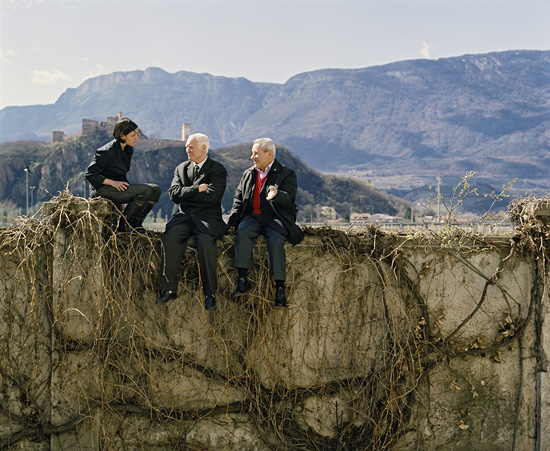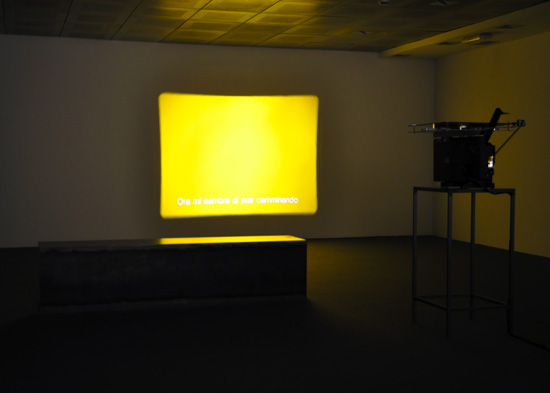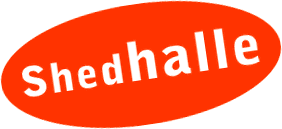Rossella Biscotti “Everything is somehow...”, “Yellow Film”, “Pharmaceutical Dreams”
Shedhalle / Exhibitions / Cross-fades / Artists

Rossella Biscotti “Everything is somehow related to everything else...”, newspaper, 2008 (photodetail)
Everything is somehow related to everything else, yet the whole is terrifyingly unstable
Photographs of a performance as newspaper edition, 2008
At the lower end of one of the walls of the exhibition hall we see a series of photographs on newsprint depicting Rossella Biscotti walking on a city wall, partly covered by leaves, partly peeling off. 60 years ago, this wall encircled the transit camp of Bolzano from which, toward the end of the war, Jews, members of the resistance, conscientious objectors, and dissidents were moved to Mauthausen, Flossenbürg, Dachau, Ravensbrück, and Auschwitz – and where, meanwhile, modern residential houses have been built. Today, this wall separates the compound from the rest of the city.
Rossella Biscotti demonstrates, physically, how knowledge of and ignorance of historical evidence shape our urban landscape and how history becomes the mediator of the present. The construction of the housing complex at the site of the former transit camp puts a new layer on the perception of what happened but does not erase the traces of the past. “What I’m interested in is connecting memories of the (historical) past with my feeling of dizziness which comes from a pronounced fear of heights. What the two phenomena have in common is a non-linearity of perception and a shift in space and time. Things surrounding the individual are fragmented, hovering in space, making the person lose any sense of dimension and time. Things seem to come closer while distances seem to increase, grow more distant. Everything becomes blurred. Pictures seem overlapping. All this results in a feeling of dizziness oscillating between the space of memory, pure memory, and the present context.” (R. B.)

Rossella Biscotti “Yellow Film”, 16mm, 2010
Yellow Film 16mm-Film, 2010
Pharmaceutical Dreams 4 Photographs, 2010
“I want to try to descend deep into myself then I don’t know what I will encounter”. We hear this sentence told in Dutch and we can read the English subtitles. The voice is speaking slowly, falters; now and then it is interrupted by a question. What we hear is unbelievable, the speaker seems unwilling or unable to talk: “No, no, that’s very bad.” Rossella Biscotti’s “Yellow Film” consists of recordings of different therapeutic sessions held by a psychiatrist in Holland in the late 80ies to cure people traumatised by WW II with the help of Pentothal. The drug, also known as «truth serum», narcotizes patients in order to make them remember and enable them to talk about their remembrances.
Rossella Biscotti’s installation avoids any illustrative or narrative aesthetics. We see 80 different shades of yellow created by filters the artist exposed her film to. Such filters usually are applied to change the atmosphere in different scenes; here they underscore the attempts of the patients to deal with their inexpressible past. Listening, we realise that the patient has to pierce different layers of his memories, that the original event is no longer there. One can detect a net of strata, vague deposits and cross-fades. “Yellow Film” can be seen as a different kind of historiography collecting the most personal as well as – since buried in the unconscious – the most unpersonal and presenting it as common history to be collectively worked through. In addition to the installation, the artist shows Pharmaceutial Dreams, the photographs. They are based on picture postcards the pharmaceutical company used as promotion material for Pentothal.
